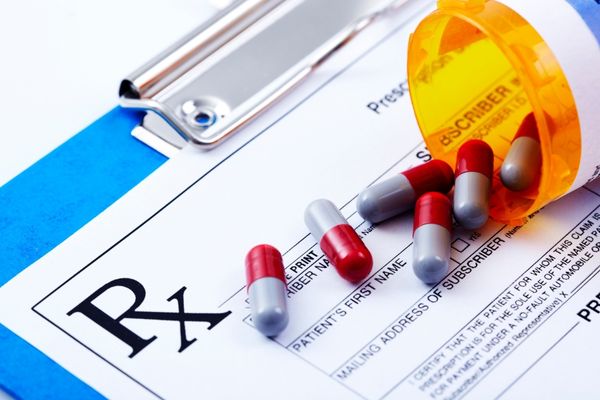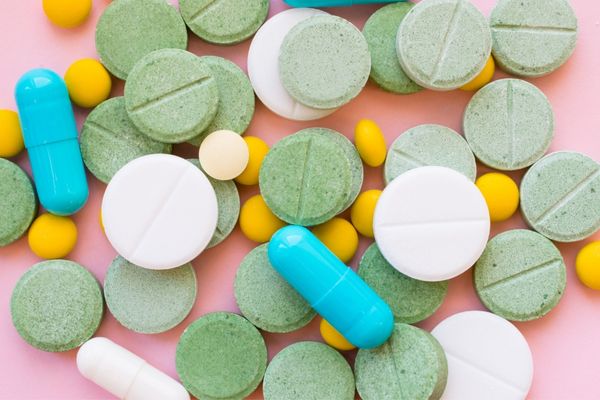
When your dog is feeling uncomfortable and is obviously in pain, it’s tempting to give her an over-the-counter human medication. But instead of helping her feel better, human meds can cause a great deal of harm to your pup, and may even result in a fatal reaction.
Rule of thumb: Never give your dog human medications unless your veterinarian specifically instructs you to.
Here are 9 household medications you must keep out of your dog’s reach:
1. Multivitamins

Human vitamins commonly contain four ingredients toxic to dogs: xylitol (can cause low blood sugar and liver failure), vitamin D (can cause secondary kidney failure), iron (can cause severe vomiting, diarrhea, and organ damage or failure), and calcium (can cause mild stomach upset to kidney failure).
Rather than giving your dog human multivitamins, feed your dog a balanced diet and ask your veterinarian to recommend vitamins or supplements specially formulated for dogs.
2. Topical Creams and Ointments

When you apply lotions, oils, creams, or ointments to your own skin, don’t allow your dog to lick your skin. Some of the ingredients found in these products can cause serious or life-threatening gastrointestinal problems in dogs.
Read the label and be especially wary of products that include:
- baclofen
- calcipotriene
- dibucaine
- diclofenac
- 5-fluorouracil
- flurbiprofen
- ketamine
- lidocaine
3. Acetaminophen

Acetaminophen is the active ingredient in Tylenol®, Percocet®, aspirin-free Excedrin®, and other sinus, cold, and flu medications. Acetaminophen helps reduce fever and general aches and pains in humans.
However, when a dog eats acetaminophen tablets, the results can be catastrophic. Acetaminophen poisoning can cause permanent liver damage or liver failure, abnormal red blood cells, lack of oxygen, and dry eye.
If you believe your dog ingested acetaminophen, seek emergency veterinary attention immediately.
4. Non-Steroidal Anti-Inflammatory Drugs (NSAIDs)

In the same way that acetaminophen can wreak havoc on your dog’s system, human NSAIDs such as Advil®, Aleve® and Motrin can cause stomach and intestinal ulcers, as well as potential kidney failure.
Even veterinary NSAIDs, when ingested in large amounts, can cause similar problems. Keep chewable veterinary NSAIDs and human NSAIDs out of your dog’s reach.
5. Nasal Decongestants

If your dog ingests a nasal/sinus decongestant containing pseudoephedrine, it stimulates the nervous system and cardiovascular systems.
Symptoms may include restlessness, agitation, hyperactivity, tremors, tachycardia, hypertension, hyperthermia, panting, and mydriasis.
6. Kaopectate and Pepto Bismol

If your dog has an upset tummy, do not treat her with Kaopectate, Pepto Bismol, or any product that contains salicylates.
Large doses of bismuth salicylate could cause gastric irritation or ulceration, bleeding problems, seizures, and liver damage.
7. ADD/ADHD Drugs and Amphetamines

Common prescription ADD drugs such as Adderall contain amphetamines, which stimulate the central nervous and cardiovascular systems. If enough amphetamines are ingested, they can cause hyperactivity, tremors and seizures, fever, abnormal heart rate and rhythm, coma, and even death.
Consult your veterinarian immediately if your pet has ingested a medication containing amphetamines.
8. Cardiac Medications

Human cardiac drugs are commonly used for hypertension and to prevent heart failure. These medications are also used in veterinary medicine, but the human variety can be dangerous to dogs when ingested in small amounts. Signs of poisoning include a very abnormal heart rate, collapse, low blood pressure, excessive thirst and urination, and even organ failure.
9. Antidepressants

Antidepressants are one of the top medications prescribed by doctors, and some of these medications are also used in veterinary medicine to treat behavior problems and anxiety.
When a dog accidentally ingests human antidepressants, signs of poisoning may include hyperactivity, a racing heart rate, hypertension, dilated pupils, tremors, and even seizures.
What to do if you think your dog was poisoned
Your best line of defense is to dog-proof your home, keeping ALL medications (human and pet) out of reach. If you take multivitamins or other tablets daily, be careful not to drop tablets on the floor or to leave open bottles around.
If you suspect your dog ingested a poison, call the ASPCA Animal Poison Control Center Hotline: (888) 426-4435. For more info, visit their website.
Or call the Pet Poison Helpline (fee-based). For info, visit their website.
Learn more about dog hazards and toxins
Animal Poison Control Center Podcast
Download a free mobile app from the Animal Poison Control Center that will:
- help you identify over 300 potential hazards and toxins found in and around the home
- provide crucial information about the severity of the problem
- suggest critical next steps
Sources:
- ASPCA Animal Poison Control
- Top 10 Canine Toxins, Part 1 (Pet Health Network)
- Top 10 Canine Toxins, Part 2 (Pet Health Network)
- Acetaminophen Toxicity in Dogs and Cats (Pet Health Network)



Dropped medication in the floor. Austedo 12 mg. Will this affect my 8 week old puppy IF he happened to eat one of the pills?? I’m not 100% certain he ate one of them. I searched and picked up every one of the pills I saw. But there’s always the chance that I missed one. Will it hurt the pup in a severe or bad way. Or will he sleep it off in a couple days time. Please respond soon please and thank you!!